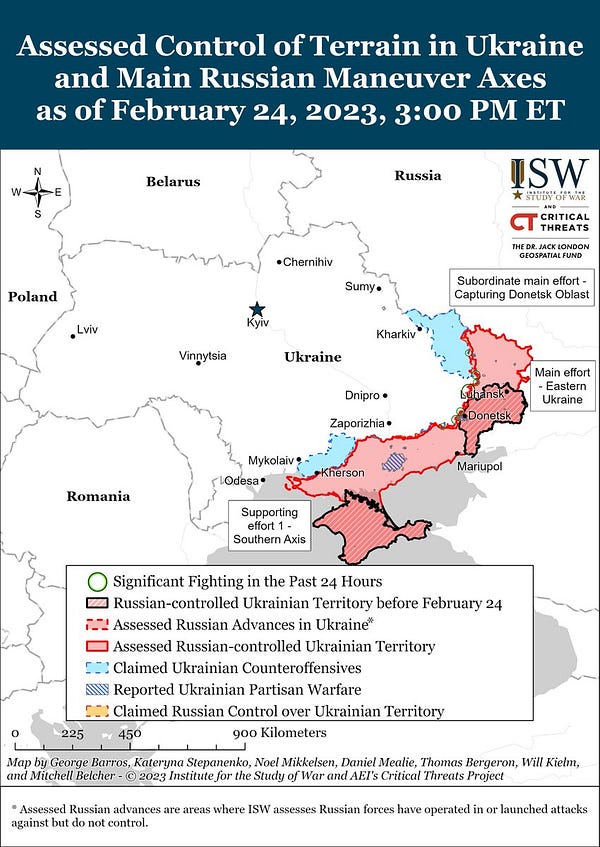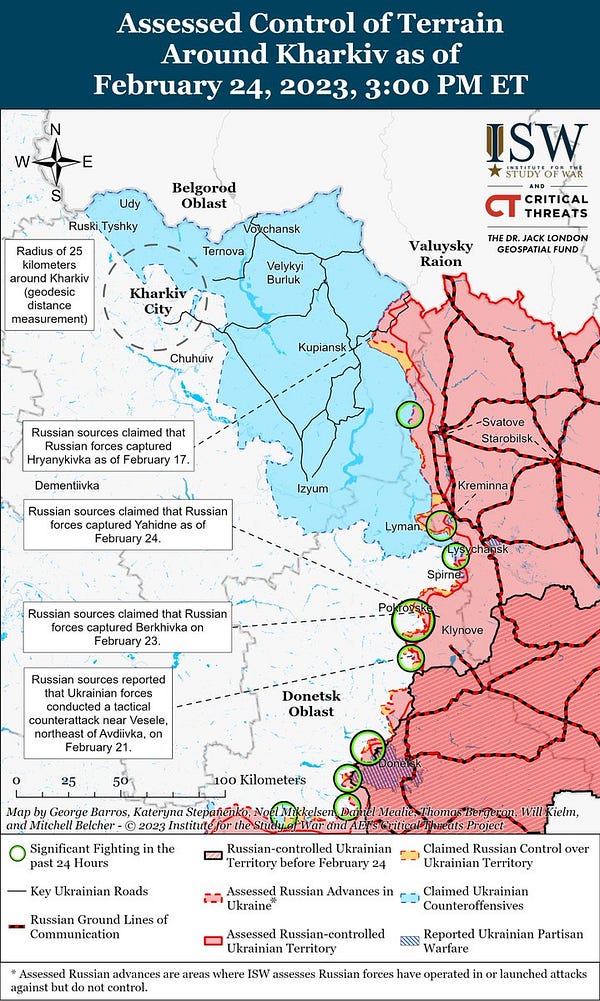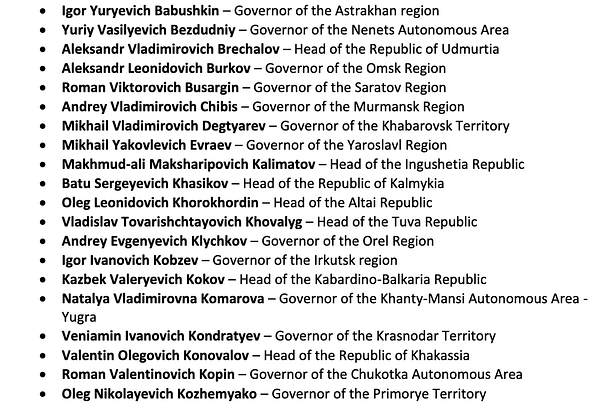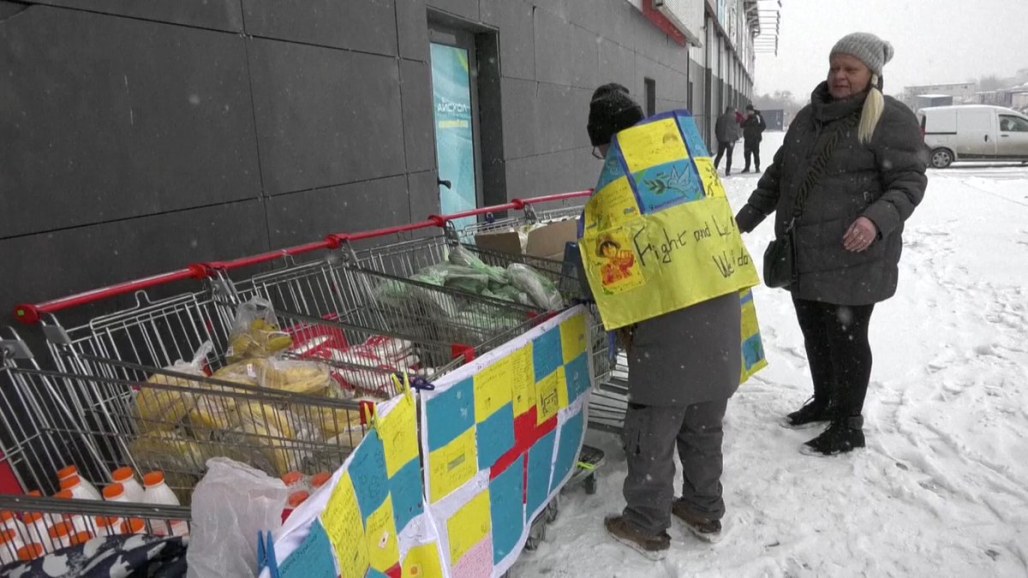Feb 25: The Saturday Edition
Day 366: Zelensky Kharkiv Prigozhin China drills RUprotesters UN/EU/G7 $7m DefencePact Marchenko Poland Japan A&Ps-WinterOnFire Intermarium BylineTimes Blinken Scherba BylineTimes McKenzie ISW SofiaUA
Catching up…
EA Worldview’s Ukraine Up-date- hop over to Scott’s amazing hourly Ukraine up-date page. I’ll fill in with some bits and bobs.
Yesterday marked the first year of Russia’s full-scale invasion of Ukraine. The war started in 2014 with a peaceful student protest, which became the Revolution of Dignity. I’m re-posting the link to the Nexflix documentary: “Winter on Fire: Ukraine's Fight for Freedom”, directed by Evgeny Efineevsky.
Stories we’re following…
President Zelensky has just posted on Telegram saying, “On 24 February, millions of us made a choice. Not a white flag, but a blue and yellow flag. Not fleeing, but facing. Facing the enemy. Resistance and struggle. “It was a year of pain, sorrow, faith and unity. And this is a year of our invincibility. We know that this will be the year of our victory!”
Russian attack on Kharkiv Oblast leaves people trapped under rubble. Russian occupants attacked the city of Kupiansk and the surrounding district of Kharkiv Oblast on Feb. 23, reports Governor Oleh Syniehubov.
Mariupol 'no longer completely unreachable' for Ukrainian military. Ukraine's Southern Command spokesperson Natalia Humeniuk said on Feb. 23 that the area of Russian-occupied Mariupol in Donetsk Oblast was "no longer completely unreachable" for Ukrainian forces.
The Ukrainian presidential adviser, Mykhailo Podolyak, has said any “peace plan” to end the conflict must involve the withdrawal of Russian troops to the borders of 1991. Posting to Twitter, he said a ceasefire that would result in the continued occupation of Russian territory “isn’t about peace, but about freezing the war, Ukraine’s defeat, next stages of genocide”.
87% of Ukrainians oppose territorial concessions. Eighty-seven percent of Ukrainians oppose territorial concessions, according to the results of a survey the Kyiv International Institute of Sociology conducted between Feb. 14-22.





A number of Russian state-controlled media outlets have been instructed not to quote statements made by Prigozhin, according to a report. Independent outlet Verstka, citing sources from the Kremlin-backed media and the Russian defence ministry, reports that Russian state journalists have been ordered not to quote Prigozhin unless absolutely necessary, Meduza writes. One source said:
In a meeting this week, the higher-ups repeated to us that the block on Prigozhin that we put in place in January remains in effect.
We’re banned from mentioning him unless it’s absolutely necessary, we’re banned from quoting him, except in cases where he’s the first person to report news about successes on the front line. For example, if they captured Soledar or reached the outskirts of Bakhmut.
Russia’s foreign ministry has warned that any actions threatening its troops in Transnistria would be seen as a direct attack on Russia itself and trigger an “adequate response”. The Russian ministry claimed on Thursday that Ukraine – which borders Moldova – posed “a direct threat” to Russian troops in the Russian-speaking region. (Nonsense)
Belarus Defense Ministry conducting 'combat readiness measures.' Belarus' Defense Ministry announced on Feb. 24 that it was conducting "combat readiness measures."

Ukraine 'deeply concerned' over joint naval drills of Russia, China and South Africa. Ukraine is "deeply concerned" about joint naval exercises that Russia, China, and South Africa launched just ahead of the one-year anniversary of Russia's all-out war, Ukrainian Foreign Ministry spokesman Oleh Nikolenko said on Feb. 24.
Throughout Russia, police have begun arresting citizens for protesting and placing flowers at memorials to mark the one-year anniversary of the full-scale war against Ukraine. By the end of the day, at least 54 people were arrested in 14 Russian cities, reports OVD Info.
Sverdlovsk’s governor tells Prigozhin to stop meddling in regional politics. The mercenary chief recently accused Governor Kuyvashev of burying killed soldiers without the promised military honors.

UN secretary general, António Guterres, addressed a meeting of the UN security council to mark the one-year anniversary of Russia’s full-fledged invasion of Ukraine. Guterres says he sat in the council a year ago and urged “in the name of humanity” not to allow “what could be the worst war since the beginning of the century” in Europe. Russia’s invasion of Ukraine is a “blatant” violation of the UN charter and international law, he says.
It has unleashed widespread destruction and displacement attacks on civilians and civilian infrastructure, and of course, many casualties and terrible suffering.
The G7 has announced a range of further economic, military and financial sanctions against Russia totalling $39 billion in 2023. The group announced it would take unprecedented measures in order to weaken Russia, promising measures against Russian diamond exports. It warned that third countries that help Russia evade sanctions would face “severe costs” and is understood to be setting up an “enforcement coordination mechanism” to stop evasion of G7 sanctions already imposed.

US announces $7 million to protect Ukrainian heritage. The U.S. State Department will invest $7 million to “support Ukrainian efforts to protect its cultural heritage,” a U.S. State Department press release said on Feb. 23.
France, Germany, UK suggest defense pact with Ukraine. France, Germany, and the U.K. believe that closer links between NATO and Ukraine may serve as a way to encourage Kyiv to begin peace talks with Moscow this year, the Wall Street Journal reported, citing officials from the three countries.
The UK said it was banning the export of every item Russia has been found using on the battlefield to date, a list covering hundreds of goods, including aircraft parts, radio equipment and electronic components. The British government is also imposing sanctions on senior executives at Russia’s state-owned nuclear power company Rosatom.
The EU is expected to announce a ban on €11bn (£9.7bn) worth of exports of critical technologies to Russia, as part of a 10th round of sanctions. Despite plans to have the measures in place by the first anniversary of the invasion, the latest measures were being held up by a last-minute dispute over how quickly to ban synthetic rubber imports from Russia. Italy objected to a rapid phase-out, while Poland blindsided other member states with its insistence the trade be stopped as soon as possible.

More property and assets belonging to Medvedchuk's wife seized. Ukraine's Security Service (SBU) reported on Feb. 23 that property and assets belonging to Oksana Marchenko, the wife of disgraced pro-Russian lawmaker Viktor Medvechuk, were seized. The total value of the assets is Hr 5.6 billion ($152 million).
Poland has delivered its first Leopard battle tanks to Ukraine. Its prime minister, Mateusz Morawiecki, has now confirmed that his country has delivered four Leopards to Kyiv already. He said Poland will provide more Leopard tanks soon, as well as a number of upgraded, Soviet-era T-72 tanks. Poland has pledged 14 German-made Leopard 2 tanks to Ukraine.
Sweden will send up to 10 Leopard tanks and anti-aircraft systems to Ukraine, the prime minister, Ulf Kristersson, and defence minister, Pål Jonson, said today.
Japan is considering new sanctions against Russia in line with moves by other Group of Seven (G7) countries, the prime minister, Fumio Kishida, has said. At a news conference to mark the first anniversary of Russia’s invasion, Kishida said Moscow was refusing to change its “hardline stance”, adding: “The international community must come together and show solidarity and impose strong sanctions against Russia.”
Canada will provide more than $32m (£19.7m) in support to further strengthen Ukraine’s security and stabilisation, its government has announced. Canada’s foreign minister Mélanie Joly said: “For an entire year, Canada and the international community have rallied like never before to support Ukraine’s resilience in the face of President Putin’s aggressions. Canada’s support for Ukraine’s sovereignty is unwavering. We will not stand down until Russia is held accountable for its crimes.”

Chancellor Scholz promised to support Ukraine for as long as necessary and called on Russia to end the war in a video: "The sooner Putin admits that his imperialist goal will not be achieved, the more chances there are for the war to end. Everything is in Putin's hands. He can stop this war," Scholz said.
King Charles III has issued a message marking the first anniversary of the conflict in Ukraine praising the “remarkable courage and resilience” of the nation’s people. Charles said in his message: “It has now been a year that the people of Ukraine have suffered unimaginably from an unprovoked full-scale attack on their nation. They have shown truly remarkable courage and resilience in the face of such human tragedy[….]
The invasion of Ukraine has sparked interest in learning the country’s language among the British public, with the University of Sheffield launching new courses for students and the public, assisted by academics from Lviv. The university says that its beginners classes in Ukrainian language and culture for the public are the first of its kind in the UK.
Prime Minister Orbán said on Friday more talks between parliamentary groups were needed before Hungary’s ratification of Finland and Sweden’s Nato membership, which lawmakers will start debating next Wednesday.


China’s peace proposal in 12 points…
President Zelenskiy has welcomed some elements of a Chinese proposal for a ceasefire in Russia’s war on Ukraine. “China has shown its thoughts. I believe that the fact that China started talking about Ukraine is not bad,” Zelensky said.
Russia appreciated China’s plan to resolve the conflict in Ukraine and was open to achieving the goals of what it calls its “special military operation” through political and diplomatic means., foreign ministry spokesperson Maria Zakharova said. However, this would also mean recognising “new territorital realities” in Ukraine, Zakharova said.
Western leaders have largely dismissed China’s peace plan for Ukraine, arguing that Beijing does not have the international credibility to act as a mediator in the Russia-Ukraine conflict.
Antony J. Blinken, Secretary of State- Russia’s War against Ukraine- One Year Later
One year ago today, President Putin ordered a full-scale invasion of Ukraine following months of deceit about why Russia had amassed huge numbers of soldiers on Ukraine’s border. It was then that Russia’s forces illegally crossed into Ukraine’s sovereign territory to wage a war that has needlessly killed tens of thousands of people and harmed millions more.
President Putin’s decision has ripped apart families, forced millions from their communities, destroyed homes, schools, hospitals, and other civilian infrastructure, exacerbated a global food crisis, destabilized energy markets, and undermined international peace and security. This war has shredded Russia’s international reputation, left Russia weakened and isolated, and decimated its economy. This war is an attempt to seize territory from Ukraine and thwart its independent, democratic trajectory.
As, the President said in Kyiv this week, “One year later, Kyiv stands and Ukraine stands.” Ukraine’s fight and its people’s resolve and resilience have emerged as an inspiration to the world, showing they will not be cowed. Ukraine’s indomitable will has rallied the world to its cause, with people of conscience around the globe united behind Ukraine, and with repeated calls from the halls of the UN for Russia to end its war of choice.
President Putin started this illegal war, and he has the power to end it. The United States stands strongly with Ukraine as it defends itself, and we will continue to do so until Ukraine’s sovereignty is respected and the people of Ukraine can shape their chosen, democratic future in freedom and peace.



The Department of State
If you missed Secretary Blinken's conversation on “Russia’s War on Ukraine: One Year Later” with @TheAtlantic today, there is still time to watch:
Banco, Graff, Seligman, Toosi & Ward, ‘Something Was Badly Wrong’: When Washington Realized Russia Was Actually Invading Ukraine- Politico
For nearly a year prior, U.S. and Western officials had signs of what was coming: a suspicious buildup of Russian troops, intelligence about the Kremlin’s plans, statements from President Vladimir Putin himself. Those officials raised increasingly specific public alarms, some of which were based on a novel new strategy of rapidly declassifying and publicizing intelligence in near real-time, and made desperate attempts to avert a war, even as it became more and more clear that Putin was determined to invade.
The events in eastern Europe in 2021 and 2022, coming just as the world emerged from the Covid-19 pandemic, also unfolded against a fraught geopolitical backdrop: In 2014, Russia had already seized Crimea from Ukraine, and fighting by Russia’s irregular, unmarked troops, known as “little green men,” had destabilized eastern Ukraine and led to a long-running, low-level war that had continued ever since. Meanwhile, during the summer of 2021, the United States faced its own challenge: a chaotic and controversial end to its nearly 20-year war in Afghanistan.
This is the story of the Biden administration’s strategy and reaction to that looming Russian invasion — the battle to persuade skeptics and rally foreign allies to confront an almost-unthinkable threat, one that continues to shake the world today. All titles and military ranks are presented based on roles the speakers held in February 2022, and interviews have been condensed and edited for clarity.


Nick McKenzie, Fake Russian diplomats revealed as heart of ‘hive’ spy ring in Australia- The Sydney Morning Herald
A highly active “hive” of Russian spies posing as diplomats operated in Australia for more than 18 months before it was dismantled as part of a sweeping and aggressive counter-espionage offensive by ASIO.
The Australian intelligence agency spent months tracking the Russian spy ring, which comprised purported embassy and consular staff and operatives using other deep cover identities, before ASIO finally moved to force the ring’s key players out of Australia, according to sources with knowledge of its operation.
ASIO director-general Mike Burgess described the spying operation in a major speech he delivered in Canberra on Tuesday, but did not name Russia.
Sources confirmed ASIO had uncovered the spy ring operating out of a number of locations, including the Russian embassy in Canberra, while the Morrison government was in power.
The spy ring’s aim was to recruit Australians with access to classified information and, according to one source with knowledge of the Russians’ activity, use sophisticated technology to steal data and communicate without being intercepted.




